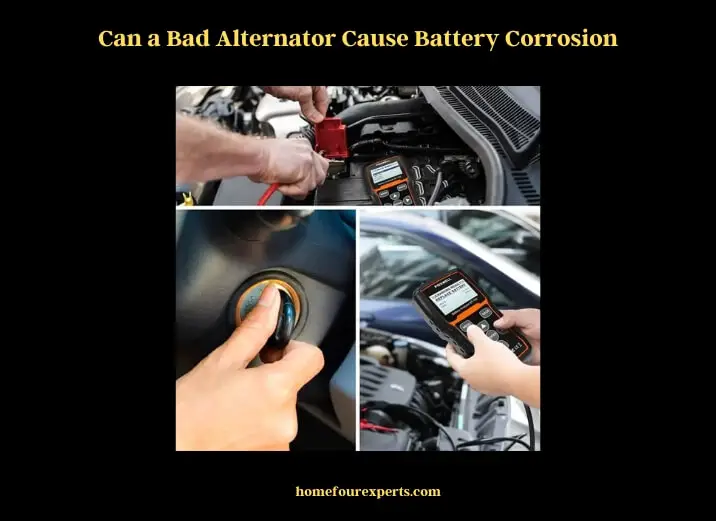Small amounts of corrosion are typical, but it is wise to get your charging system checked out before it’s too late if you detect an extraordinary quantity. Whether it’s a poor battery, bad alternator, or anything else reasons behind, corrosion weakens batteries and makes them more dangerous to jump.

Now you may ask, can a bad alternator cause battery corrosion? Certainly, alternator failure could possibly be the cause. A faulty cell in the battery is one of the most prevalent causes of overcharging.
Automobile batteries do fail spontaneously. However, a failing alternator can result in your automobile battery draining and being uncharged. The alternator will overcharge the battery, causing it to generate more corrosive hydrogen gas than is safe.
If you regularly have to jump a car battery or if your battery fails, it’s wise to check your car’s alternator. That is why we are here! Let’s clarify what you need to know about the relation between alternator and battery corrosion. It could be beneficial for you to have more detailed information.
An Alternator’s Purpose
One purpose of alternators is to supply power to the vehicle’s electrical system, lights, and other interior accessories while the engine is running. The second is to charge the battery to start the car, prime the gasoline pump, and crank the engine. The most asked question we got is, can a car run with a bad alternator? No, you can’t drive fast without an alternator. A car without an alternator cannot start since it charges the battery. A dead alternator means a dead battery.
An electrical system failure can be caused by a variety of factors other than a significant component failure. When looking for a problem, look for corrosion, grounding concerns, and open circuits. Rather than just throwing parts at it, figure out what’s wrong first.
Symptoms of a Bad Alternator
If you find your car’s battery is ok, then the problem may be an alternator malfunction. The prospective symptoms of a bad alternator are as follows:
1. Cranking Issues And Engine Stalls
An alternator that fails will have problems charging the battery. As a result, the car battery won’t have enough charge to start. If your car’s engine stalls almost quickly following a jump start, the alternator is likely to blame.
Frequent engine stalls would also indicate an alternator failure. If your engine won’t start but your headlights function, you may have a faulty starter motor.
2. Inconsistent or Weak Headlights
Your headlights may fade, brighten unevenly or even flicker. This could suggest the alternator isn’t delivering enough power. You can test it by accelerating the engine. If your car’s headlights brighten at high RPMs, then fade when you let go, your alternator is malfunctioning.
3. A Defective Battery
This can be perplexing because it appears to indicate a battery issue. However, a dead car battery is not necessarily the cause of vehicle startup troubles. Bear in mind that a malfunctioning alternator will not charge the vehicle’s battery, resulting in a dead battery on the next crank attempt.
4. Fade Indoor Lighting
It’s a sign of a malfunctioning alternator if your car’s interior and dashboard lights decrease progressively while the engine is running.
5. Growling Noises
A car’s growling or screeching sound is never a good indication. If the screaming increases louder when the heater or stereo is on, the alternator may be failing. An alternator belt may also cause these sounds out of alignment with the alternator pulley. Turning the AM radio to a low dial with no music and revving the engine is another way to detect a faulty alternator. A hazy sound could indicate an alternator failure.
What is Battery Corrosion?
Corrosion commonly appears as a crystalline and powdery accumulation on the battery. Chemical processes determine the colour of corrosion. It’s usually white, blue, or a blend of the two. It seems like your battery is sprouting rocks or mould.
If you look at your battery and see anything that matches what we just described, it has begun to corrode. While tiny amounts of corrosion are harmless, unchecked corrosion can cause serious complications.
What Causes Battery Corrosion
For a variety of causes, battery terminal corrosion occurs. We’ll take a closer look at how corrosion affects batteries and the common reasons here.
1. Ventilated Hydrogen
Sulfuric acid and water make up the electrolyte solution in a lead-acid battery. Chemical reactions in the battery generate electricity, which is then vented out through top venting blocks. The gas can potentially leak via the battery post-to-plastic, causing corrosion.
With other gases and compounds in the engine compartment, the hydrogen gas causes corrosion. Corrosion can sometimes suggest battery difficulties. The negative terminal of an undercharged battery commonly corrodes. However, positive terminal corrosion usually indicates overcharging.
2. Overcharged Battery
Every few months, some lead-acid batteries need to be topped up. The electrolyte can leak out of overfilled batteries, corroding the metal terminals. There is no reason to go any further when it comes to battery charging.
3. Electrolyte Solution Leak
An electrolyte solution leak can occur if a lead-acid battery is broken or tipped. A buildup of electrolyte solution may cause corrosion on the battery terminals.
4. Overheated Car Battery
An overcharged battery will become hotter. The volume of the electrolyte will expand and potentially boil and steam acidic gases from the vents. Battery terminals can be corroded by sulfuric acid steam or liquid that leaks from the battery.
5. Copper Clamps Chemical Reaction
The copper in the connector clamp conducts electricity well and resists corrosion. However, combining sulfuric gas leakage from the battery with an electrical current can generate copper sulphate corrosion. You should regularly clean the blue-green material on a terminal.
How Do You Stop Battery Corrosion
Battery corrosion does not drain the battery, but it does reduce the cell’s performance. When we face battery corrosion, often we think, do I need a new battery if there is corrosion? Certainly not because car battery terminals can easily be cleaned to make it work again. But remember, don’t touch the corrosion elsewhere on the battery. Here are some ways to keep your car battery from corroding.
1. Compressed Copper Terminals
To protect your battery, use compression terminals. Complete 360-degree contact with the battery cable helps disperse the electric current accurately and acts as a protective.
2. Fix Charging Issues
If you assume that your car battery is rusting due to under-or overcharging, take it to a repair. Charge difficulties may affect more than just the battery.
3. Maintain A Schedule
Regular vehicle maintenance ensures that your car battery is inspected and maintained on schedule.
4. Felt Washer
Felt battery washers are one of the simplest ways to protect your battery against corrosion. These chemically treated washers help collect vapour from the battery terminal and persist for years. Remember to lubricate the top of the washer and the car battery terminal before mounting.
5. Stable Coating
To prevent corrosion, apply a protective battery lubricant or petroleum jelly to the battery connection. Vaseline can be applied to the terminals either during the installation process or after being cleaned of corrosion. This will help to keep things appearing tidy. Because battery grease is silicone-based, it lasts longer than petroleum jelly when heated. A rust inhibitor spray would also help.
FAQs
What Is the Impact of Corrosion on a Battery?
If enough corrosion has grown on the terminals, the amount of current passing through the terminals will be reduced. You’ll notice a decrease in power and may even require a jump start to get back up and running again. So, if you find corrosion, clean it up as soon as possible.
Does a Corroded Car Battery Need to Be Replaced?
The normal lifespan of a battery is between three and five years. You should regularly remove and clean the battery cables if corrosion is severe. After regular care, if the corrosion appears again, the original battery in your car may need to be replaced to avoid a future issue.
Final Verdict
A typical symptom of battery wear and tear is corrosion on the surface of the vehicle’s battery. While battery corrosion is a frequent occurrence, an excessive amount of it can indicate the presence of a more significant underlying problem. We hope this article can realize your worries by answering your question: Can a bad alternator cause battery corrosion? If so, then this little guide is thriving.
Featured image credit: Amazon.com
Read more:
About This Writer

Hi, I am responsible for the 'Homeowners Power Solutions' category. My name is Liam Jaxon and a licensed technician with 7 years of experience in vehicle batteries, electrical gadgets, and home appliances. My working experience in different residential & light commercial electrical sectors and the automobile industry helped to acquire vast knowledge in this industry.